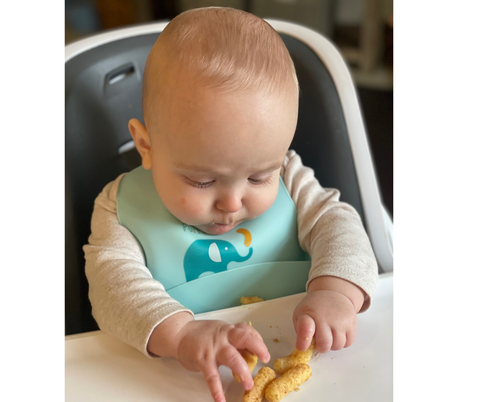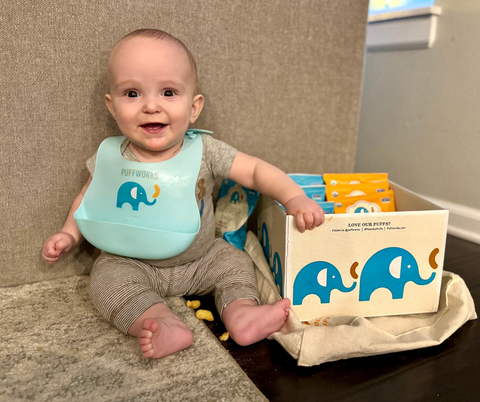All About Allergens - Owen's BLW Journey Continues
Owen loves BLW! Over the course of the last few months, we gradually introduced allergenic foods to Owen (one at a time!) to ensure he didn’t have any reactions. The result? He loves yogurt, cheese and eggs and kicks his little feet with excitement whenever I open a bag of Puffworks baby puffs! Occasionally we mix some crunched up puffs into his yogurt or sprinkle some on top of his poached apples to mix up his meal-time fun. Shrimp on the other hand? Not his favorite.

Thanks to groundbreaking research, introducing peanuts (in a safe form) early - and often! - is shown to reduce the risk of a peanut allergy. And for all other allergens? Early introduction is important as well. In fact, in case you missed it, the USDA’s latest Dietary guidelines recommend parents introduce food allergens to a child in the first year of life when other foods are introduced in the diet.
According to Dr. Ron Sunog, Pediatrician, and medical advisor to Puffworks, “Delaying the introduction of allergenic foods can increase the risk of developing a food allergy. It is now widely accepted that not feeding peanut to infants contributed to the increase in the number of kids with a peanut allergy we see today and we can see first-hand how introducing allergenic foods early helps the immune system recognize these foods as safe to eat.”
Katie Ferraro, baby-led-weaning expert, mom of seven agrees! As a part of her BLW 100 First Foods approach, she recommends introducing a new potential allergen weekly alongside other varieties of foods. “It’s so important to introduce these foods early and continue to make them a part of your baby’s regular meal-plan.” A lot of parents still can be skeptical, but Dr. Ron provides some peace of mind explaining that about 98% of babies will NOT have a food allergy, so there’s no harm in introducing these allergens early. “Some key things to watch out for are whether there’s a history of food allergens in the family and/or severe eczema.” He also adds that “If a baby has a reaction to milk or egg early on, they can be higher risk for developing a peanut allergy.”
Making it easy to introduce peanuts – and now almond – to your baby early is central to our mission. Our Puffworks baby organic peanut butter puffs are the perfect size and texture for introducing peanuts early – and often. They dissolve easily and are easy to hold. Plus, they don’t have any added sugar and minimal amounts of salt (<15 mg/serving). Once your little one has shown to tolerate peanuts, you can introduce our almond puffs as it’s important to note that they do contain a little bit of peanuts.
If your baby can tolerate both allergens, then we recommend subscribing and saving to our Puffworks Baby Variety pack to make the constant on-the-go snacking adventures simple and delicious!
Fortunately, Owen hasn't had any allergic reactions or food sensitivities, but it's a good idea for anyone who cares for and feeds infants to discuss with the baby’s provider on how to recognize an allergic reaction and what to do before they start the baby on solids. The top nine most common allergenic foods are below, along with some helpful tips on how we introduced Owen to them safely:
🥚 Egg
We made over-hard eggs (no runny yolk!) and then cut them into slivers (about the size of an an adult finger). He loves eggs! And preparing it this way allowed him to hold it with his fist to self feed.
🥛 Milk
We introduced him to dairy via yogurt. Greek yogurt with no added sugar or flavoring. We also switch it up sometimes and give him ricotta cheese (and top it off with shaved frozen fruit or crunched up puffs!).
🥜 Peanut
Puffworks baby peanut puffs but of course!
🌰 Tree Nut(s)
Puffworks baby almond butter puffs for the win! These contain a little bit of peanut butter, so it's important to ensure your baby can tolerate peanut first, otherwise you can thin out almond butter with breastmilk or formula (or water) or spread it onto a teething cracker very thinly.
🐟 Fish
We cooked up some salmon and cut it into slivers he could grab by the fistful! He really enjoyed salmon (and halibut). Pro tip: Avoid adding salt to baby’s foods so they can learn to taste the flavor of the food and not the salt. If you're making salmon for you/your family, set a few pieces and/or sections aside for your baby that aren't seasoned.
🍤 🦞 Shellfish
We introduced him to shrimp after egg, so we could mince up grilled shrimp and mix it into an omelet. We also tried boiling it and cutting it in a safe way, but he just threw it to our dog. So needless to say, he was NOT a fan of it.
🌾 Wheat
We introduced wheat via whole wheat toast! Toast is also a great "dipping" tool, so we sometimes give it to him with yogurt too. It's messy but he seems to like it!
🪴Soy
We steamed tofu and cut it into the size of an adult finger so he could easily grab it.
🌱Sesame
Once he tolerated wheat ok, we put a thin layer of Tahini (ground sesame paste) on some toast (another option would be to also put a thin amount onto a teething cracker). Reminder: thick globs of any nut or seed butter can be a choking risk.










